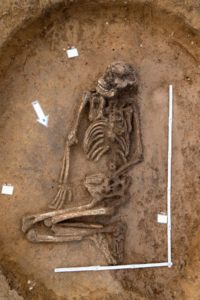 Archaeologists have discovered the skeletal remains of an adult male dating back to the Middle Neolithic under a cornfield in Lower Franconia, Bavaria. The skeleton was found under less than 16 inches of top soil but despite the agricultural activity that took place for decades a foot above him, the bones were in unusually good condition with the skeleton almost complete and all the teeth still pearly white. The high lime content of the soil preserved the bones by preventing their calcium oxide from leaching out into the ground.
Archaeologists have discovered the skeletal remains of an adult male dating back to the Middle Neolithic under a cornfield in Lower Franconia, Bavaria. The skeleton was found under less than 16 inches of top soil but despite the agricultural activity that took place for decades a foot above him, the bones were in unusually good condition with the skeleton almost complete and all the teeth still pearly white. The high lime content of the soil preserved the bones by preventing their calcium oxide from leaching out into the ground.
A winery plans to built a new facility on the 3.2 acre site and because archaeological material has been found in the area before, archaeologists were engaged to excavate the site before construction began. The Neolithic skeleton, dubbed “Fred” by the archaeological team, was found in a crouched burial position, his legs turned to the side and his knees bent. In the grave with him were a worn stone axe and seeds of some type of grain. He was between 20 and 30 years old at the time of his death about 6,500 years ago.
According to Dr. Heidi Peter-Rocher, a professor of archeology at the University of Wurzburg, Fred’s bent leg burial pose was one of several used by communities in the area during the Neolithic Period. Scientists are divided about what the pose could mean, with some speculating that it is meant to emulate humans’ position at birth or during sleep.
Along with Fred, archeologists found ceramic plates, remains of food, seashells and other graves. These included the skeleton of a 12 year old boy who was buried in the area some 4,500 years ago at the dawn of the Bronze Age.
 To ensure the most meticulous possible excavation, archaeologists removed the skeleton en bloc, digging a perimeter trench around it and fitting a wooden box around the section of soil with Fred still embedded in it. He will be transported to Munich for thorough examination in laboratory conditions.
To ensure the most meticulous possible excavation, archaeologists removed the skeleton en bloc, digging a perimeter trench around it and fitting a wooden box around the section of soil with Fred still embedded in it. He will be transported to Munich for thorough examination in laboratory conditions.
Fred’s fate after that is uncertain. Bavaria is the only state in Germany with a law granting full ownership of archaeological finds to the landowner, not the state. That means the wine cooperative Franconia gets to decide whether they want to keep Fred, the other human remains and artifacts. If they keep the Neolithic skeleton, however, they will have to pay to store and conserve it and that’s an expensive proposition. The discoveries will delay the construction of the new wine-making facility already and the excavation costs alone are expected to run in the area of two million euros. The company has not yet decided if they’ll give Fred to a museum or pay the significant moneys necessary to conserve him in perpetuity.